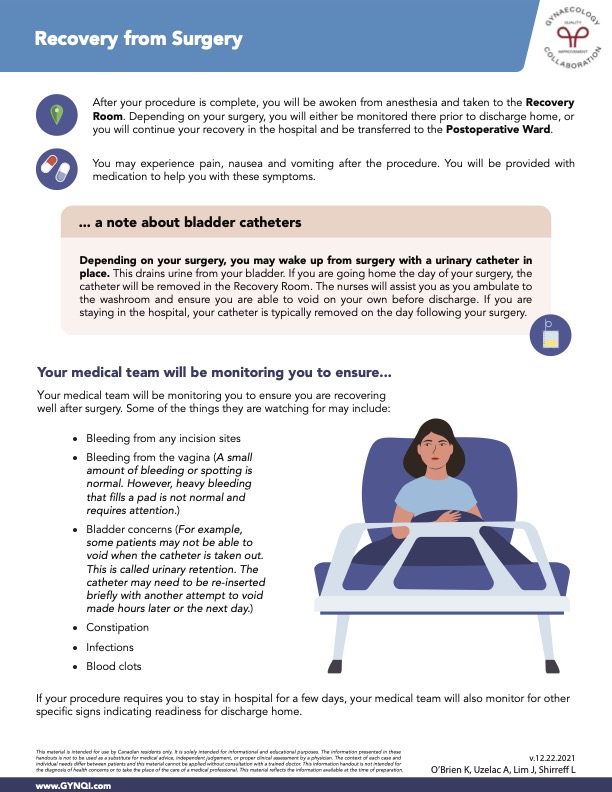
Table of Contents
- Summary
- After Your Procedure
- A Note About Bladder Catheters
- Your Medical Team’s Role in Your Recovery
- Concerns That Require Immediate Attention
- Preparing to Be Discharged
- Being Informed on Your Recovery Journey
Summary:
- After surgery, you’ll wake up in the Recovery Room and either be sent home after monitoring or continue recovery in the Postoperative Ward, with medications provided to manage symptoms like pain and nausea.
- Some patients may have a urinary catheter post-surgery, which will be removed before discharge if going home the same day. If staying in the hospital, typically it will be removed the day after surgery.
- Your healthcare team will monitor key symptoms such as constipation, infections and blood clots to ensure smooth recovery, with bleeding and inability to void being a major concern.
- Communication with your medical team and following your care plan are vital for a safe and successful recovery. Always report any abnormal symptoms to your healthcare provider.
After surgery, the focus shifts to ensuring a smooth recovery. You may experience discomfort or other symptoms, but your medical team is there to guide you through the process, providing medications and monitoring for key signs of progress. Whether you’re recovering at home or in the hospital, it’s important to follow your care plan and communicate any concerns. Your recovery is a partnership between you and your healthcare providers, designed to get you back to feeling your best.
After Your Procedure
After your surgery has been completed, you’ll be awoken from the anesthesia and taken to the Recovery Room. Depending on the procedure, you’ll either be monitored for a bit and then sent home, or you will continue your recovery in the Postoperative Ward.
It’s normal to feel some pain, nausea or even vomiting after surgery, and in most cases you will be provided medication to help with the symptoms.
A Note About Bladder Catheters
Depending on your surgery, you may wake up from the procedure with a urinary catheter in place. Catheters drain urine from your bladder. If you are going home the day of your surgery, the catheter will be removed in the Recovery Room. After removal, the nurses will assist you as you move to the washroom. The goal is to make sure you’re able to void on your own before being discharged.
If you are staying in the hospital, your catheter is typically removed on the day after your surgery.
Your Medical Team’s Role in Your Recovery
Your medical team is there to provide you with support during your recovery. Symptoms they will be monitoring include:
- Constipation
- Infections
- Blood clots
Concerns That Require Immediate Attention
It is important to keep your medical team informed if you notice any of the following:
Bleeding from the vagina: A small amount of bleeding or spotting is normal, but heavy bleeding (that can fill a pad) is not normal and requires immediate attention.
Bladder concerns: Some patients experience urinary retention and may not be able to void when the catheter is removed. The catheter may then need to be re-inserted briefly, with another attempt to void made hours later or during the next day.
Preparing to Be Discharged from the Hospital
If your procedure requires you to stay in the hospital for a few days, your medical team will also be monitoring for other specific signs indicating your readiness for discharge home.
These can include:
- Personal status: how you feel on the day of your discharge.
- Knowledge: how to care for yourself at home after being discharged.
- Perceived coping ability: how you will cope at home.
- Expected support: how much at-home help you will need and who do you have to support you.
Be sure to follow through on your recovery plan, and arrange for a ride home from the hospital if needed.
Being Informed on Your Recovery Journey
Your recovery after surgery is a crucial time, and your medical team is here to support you every step of the way. Whether you’re recovering at home or in the hospital, with the right care and monitoring, you’ll be on your way to feeling better soon. Be informed on your recovery journey by staying in close communication with your healthcare providers and following your recovery plan. And remember–if you experience anything out of the norm, let your doctor know right away.



